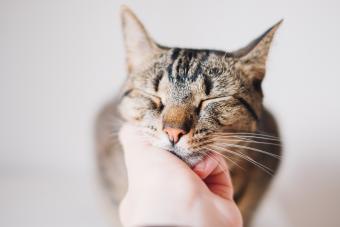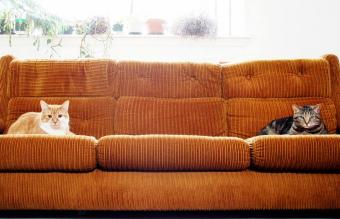
Any time you see changes in your cat's behavior - even those that are favorable - it can cause you to worry about them. If your typically temperamental cat is suddenly more affectionate than usual, they could be trying to tell you something. Find out what that is by keeping an eye out for other changes in their behavior or lifestyle.
Potential Reasons for Your Cat's Sudden Affection
An independent cat that suddenly crawls into your lap, rubs up against your leg, or begs for head scratches might alarm you. But, before you ask, "Who are you, and what have you done with my cat?" consider whether any of these circumstances could be to blame.
- Environmental changes: Any time there's a change in your cat's living situation - such as moving to a new place, or even redecorating your old place - it can contribute to increased affection.
- Jealousy: If you have a new baby or pet, or a new member of the family has come into your home, your cat could be feeling jealous or insecure.
- Diet: Your cat's overall health affects their behavior a lot. If your cat is on a diet, they may be more active, leading to increased affection.
- Hormones: Cats who are in heat or pregnant are dealing with rising hormone levels. They may want to rub up against you more than normal.
- Medical issues: Cats are famously stoic creatures, preferring to keep pain and discomfort under wraps. Your cat might be hiding an illness if they're suddenly affectionate.
1. There's Been a Change in Household Hierarchy
Just like in the animal kingdom, each household has a loose hierarchical structure. If another cat in your home recently passed or has developed health problems, this could cause a shift in the ranking. Perhaps that pet was the alpha, and your current cat was lower in social rank. Likewise, the addition of a new housemate could disrupt the hierarchy and bump your cat up in rank.
Feline head bunting - the act where a cat bumps their head against your hand, leg, or any other body part - is a behavior that cats exhibit to spread their pheromones. Typically, the dominant cat in the colony does this. So, if your cat has suddenly begun rubbing up against you, they may have earned the place as the highest in social rank.
2. They're Feeling Jealous or Insecure
Sudden affection could be an emotional response to a change in the household or environment. The addition of a new family member, such as a baby, another cat, or even a new partner, could instill jealousy in your cat, motivating them to strive to be the center of your attention.
The best way to address these competitive tendencies is to determine the root cause and create a positive experience surrounding it. Reward your cat with attention while you're holding the new baby, or have your partner offer their favorite treat.
Get ahead of your cat's jealousy by helping them feel secure. Make sure your cat always has a safe, comfortable space where they can spend time if they get anxious or overstimulated.

3. They're on a Weight-Loss Diet
In the United States, 59.5 percent of cats are overweight or obese. When felines are losing weight, experts have found that, "Affectionate behavior increased in most cats," even after just four weeks of dieting. If you recently started your cat on a diet, this could be behind their increased affection.
4. They Are Experiencing Hormonal Fluctuations
If your female cat has not been spayed, their affection could be a sign they are in heat, or even pregnant. This is a result of fluctuations in their reproductive hormones. Cats experience their first heat around six months of age and experience a heat cycle every three weeks for the duration of their heat season. Clinginess is one of the telltale signs of a feline in heat, in addition to vocalization, purring, rolling on their back, rubbing up against things, and spraying urine.
Pregnant cats may exhibit affection or clinginess early in their pregnancy, as well. Other signs to monitor include swollen pink nipples, nausea, changes in appetite, or a growing abdomen. Even if it is early in the pregnancy, your veterinarian can likely palpate the kittens or use an ultrasound to visualize them.
5. There's a Medical Issue or Illness
Unfortunately, physical illness can lead your cat to show increased affection. An ornery cat may feel compelled to sleep beside you or crawl into your lap if they're not feeling well. And even if there are no other outward signs of illness, a problem could still be brewing.
As a survival instinct, cats typically hide any signs of illness. Therefore, they could be exhibiting subtle signs they are sick that you might miss. It's beneficial to have a veterinarian rule out medical causes if you notice any changes in behavior. Blood work or X-rays can reveal hidden conditions. If everything checks out, you can enjoy peace of mind that your feline friend is healthy.
And They Called It Kitty Love
If a cat is laying on you suddenly and showing unusual affection, it doesn't always indicate a problem, but it is important to rule out any troubling causes. If you conclude your feline is medically sound and emotionally happy, enjoy the extra love from your cat!







